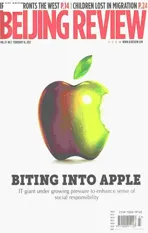THIS WEEK
2012-10-14本刊编辑部
THIS WEEK
“Technology transfer and technological cooperation shall be decided by businesses independently and will not be used by the Chinese Government as a precondition for market access.”
Chinese Commerce Minister Chen Deming, responding to questions on the alleged “forced sharing of technology” in an interview with the Bloomberg news agency on February 9
“The minimum wage increase of more than 13 percent each year will help increase the money in workers’ pockets and will also be conducive to an elevation in the level of their social security.”
Liu Junsheng, a researcher with the Labor and Wage Institute affiliated with the Ministry of Human Resources and Social Security, commenting on China’s new national employment promotion plan released on February 8
“The rise of India and China cannot only be a parallel process but, with vision and commitment, actually a reinforcing process.”
Indian External Affairs Minister S. M. Krishna speaking at the inauguration ceremony for India’s new embassy complex in Beijing on February 8
“Any outcome of national dialogue should be the result of agreement between the Syrians themselves and should be acceptable to all the Syrians. ”
Russian Foreign Minister Sergei Lavrov, telling the press on February 8 after his visit to Damascus

HAPPY FESTIVAL Streets of Haikou, capital of Hainan Province, are decorated with colorful lanterns on February 6, China’s Lantern Festival
Brave Girl
Xiang Xinyuan, a senior middle school student, won nationwide praise because she bravely saved a drowning boy in freezing winter. Xiang, 16, is a grade three student in a senior middle school in Guiyang, capital of Guizhou Province. On January 31, 2012, while walking alongside a river, she found that a little boy was drowning. Without even taking off her coat and boots, Xiang dashed into the river and swam toward the boy. After saving the boy, Xiang left silently without leaving her name.
After media reports, Xiang became famous on the Internet and she was dubbed“the most beautiful girl in Guiyang” by netizens.
“I just did what I thought was right. I never thought of becoming famous,”said Xiang.

Job Creation
China’s State Council, or cabinet, on February 8 issued a plan to boost employment by creating 45 million jobs in cities by 2015. The government aims to keep the registered urban unemployment rate at no more than 5 percent. The country also plans to create jobs for 40 million people in the countryside in the fiveyear period.
From 2006 to 2010, 57.71 million new jobs were created in urban areas and 45 million people from the countryside were able to find new jobs, according to official data.
At the end of 2011, China’s urban unemployment rate stood at 4.1 percent, unchanged from a year earlier.
The government also pledged to maintain an average 13 percent growth annually in the nation’s minimum wage standards in 2011-15, to keep the standard in most regions higher than 40 percent of the average wage of local urban employees.
China has managed to raise its minimum wage standards by an average of 12.5 percent year on year during the 2006-10 period.
New Water Source
The local government of Liuzhou, a city in southwest China’s Guangxi Zhuang Autonomous Region, announced on February 6 a plan to find an alternative source of drinking water after a toxic cadmium spill contaminated a local river in January.
Cadmium pollution was first detected in the Longjiang River on January 15 in Hechi, and it then spread to the downstream Liujiang River, threatening water supplies in Liuzhou, a city with 1.5 million permanent residents.
The city will also build a reservoir with a storage capacity of 100 million cubic meters on the nearby Guchang River.
The reservoir is designed to help meet the city’s water needs for two months in the summer and three months in the winter.
Anti-gun Campaign
China will launch a new police campaign to crack down on crimes involving guns and explosives, according to the Ministry of Public Security.
The police will be targeting major cases, tracking criminal dens and eradicating arms sales networks during the campaign that will last until November.
Police authorities have also been ordered to direct their efforts against contaminated food, counterfeit medicine, telecom fraud, the abduction of women and children as well as economic crimes.
Real-name Micro-blogging
Beijing authorities said on February 7 that users of Twitter-like micro-blogging services in the city who fail to register with their real names by March 16 will be banned from posting on those websites.
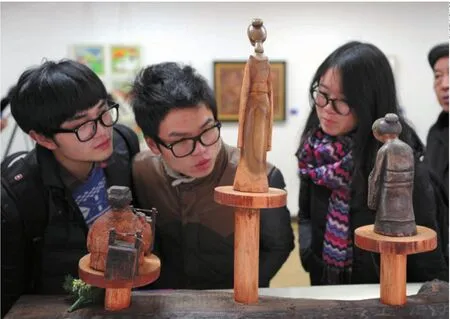
YOUNG ARTS People visit the Third Art Work Exhibition of College Students held at the China Academy of Art in Hangzhou, capital of east China’s Zhejiang Province, on February 8

MOON MAP China on February 6 published a complete set of lunar maps and lunar images, which cover the entire surface of the moon. With a resolution of 7 meters, the images were captured by China’s second lunar orbiter, Chang’e-2
The ultimatum came nearly two months after the city introduced guidelines mandating real-name registration for microbloggers.
After Beijing’s initiative, several other Chinese cities, including Guangzhou and Shenzhen in Guangdong Province and Shanghai, have adopted similar rules, as authorities believe micro-blogs help spread rumors and vulgarities.
Legal Aid
About 946,000 people sought free legal assistance in 2011, a year-on-year increase of 15.4 percent. China now has about 3,573 government-sponsored legal aid centers with a total staff of 13,800, while practicing lawyers also take legal aid cases.
In 2011, the central budget for legal aid centers increased from 100 million yuan ($15.88 million) in 2010 to 200 million yuan ($31.76 million), according to a ministry statement.
Part of the revenue from national lottery ticket sales also went to legal aid.
Fire Accountability
China will hold the country’s municipalor provincial-level officials accountable for severe fire-related accidents, according to a State Council circular on February 6.
“When major fire accidents occur, responsible leaders in, or heads of, the local government will be held accountable. If an accident has grave consequences or a nasty social impact, responsible leaders in the government will be held accountable,” according to the circular.
The circular also specified conditions for when leaders of community-level governments, public security authorities and fire departments, as well as other organizations, will be held accountable.
Along with rapid social and economic development, chances of fire accidents have increased and prevention has been made more difficult, according to the circular.
Livelihood Subsidies
Southwest China’s Tibet Autonomous Region has earmarked more than 8 billion yuan ($1.3 billion) this year to improve the living conditions of farmers and herdsmen in the region.
The fund, 68.4 percent bigger than last year’s, will be used for rural infrastructure construction and as agricultural subsidies, according to a statement released by the region’s Finance Department on February 4.
Some of the money will also be used to encourage farmers to modernize and industrialize their work, and to develop Tibetanfeatured industries, said the statement.
According to the region’s financial data, the net income per capita of its farmers and herdsmen last year surged 13.6 percent to 4,700 yuan.
Tibet Autonomous Region has a population of 3 million, over 80 percent of whom are farmers and herdsmen.
Centenarian Scholar

Yang Jingnian, a 104-year-old renowned economist, educator and translator, has become something of a legend.
Yang was born in 1908 to a poor family in Hunan Province. He went to Britain to study with government funds in 1945 and obtained a doctoral degree from Oxford University. After graduation, Yang came back to China and has been a teacher at Nankai University in Tianjin Municipality since 1948.
Yang is one of the founders of development economics in China and published several books on development economics. Yang also translated many foreign works on economics. In 1998, the then 90-year-old translated Adam Smith’s masterpiece The Wealth of Nations within 11 months. In 2007, Yang wrote an autobiography as he was turning 100 years old.

COLD SNAP Street cleaners clear snow in Yakeshi City, north China’s Inner Mongolia Autonomous Region, on February 3. Much of north China was in the grip of a severe cold spell in early February
CPI at Three-Month High
China’s consumer price index (CPI) rose to a three-month high of 4.5 percent in January, said the National Bureau of Statistics (NBS) on February 9. This growth rate is 0.4 percentage points higher than that in December 2011.
Food prices jumped 10.5 percent year on year, driving the CPI up 3.29 percentage points.
The surge was driven by a pre-Spring Festival (January 23) consumer boom, said Peng Wensheng, chief economist with China International Capital Corp. The inflation pressure is expected to ease this year.
The NBS also released the producer price index, which grew 0.7 percent year on year in January, compared with 1.7 percent in December 2011.
Tax Tussle
China said it will not require domestic airlines to pay carbon emission taxes imposed by the European Union on flights to and from Europe.
The State Council said Chinese airlines need approval if they want to join the emission plan, which the Chinese Government has denounced as an unfair trade barrier.
From January 1, the EU began charging airlines using EU airports for carbon emissions based on its Emission Trading Scheme.
The money will not be collected until April 30 next year, however, and China has added its voice to a growing global protest ahead of the date.
SOEs Profitable
China’s centrally administered state-owned enterprises (SOEs) reported net profits of 917.33 billion yuan ($141.3 billion) in 2011, up 6.4 percent year on year, said the Stateowned Assets Supervision and Administration Commission (SASAC).
But the growth rate was 33.8 percentage points down from a year earlier, partly due to the difficult economic situations at home and abroad, said the SASAC. The Chinese economy grew 9.2 percent in 2011, down from 10.3 percent in the previous year.
Total revenues of the central SOEs rose 20.8 percent to 20.24 trillion yuan ($3.2 trillion) last year, 11.3 percentage points lower than the previous year.
Auto Sales Tumble
January sales of passenger vehicles in China registered their largest year-on-year decline in the past decade.
The drop was largely attributed to the two holidays in a single month—the New Year and the Spring Festival.
Combined sales of cars, sport-utility vehicles, multi-purpose vehicles and minivans nose-dived 16.5 percent from a year earlier to 1.17 million units in January, said the China Passenger Car Association (CPCA) on February 7.
It’s also the first time in recent years that these vehicle types have seen negative monthly growth rates.
“It’s in accordance with our previous expectations of 15-20 percent negative growth. The three-day New Year holiday and the week-long Spring Festival holiday (January 22-28) not only cut production days by almost 50 percent, but also led to a void in the vehicle showrooms,” said Rao Da, Secretary-General of CPCA.
Top Chinese automaker SAIC Motor Corp. said its January sales dropped 8.48 percent from a year earlier to 380,305 units.
Power Shortages
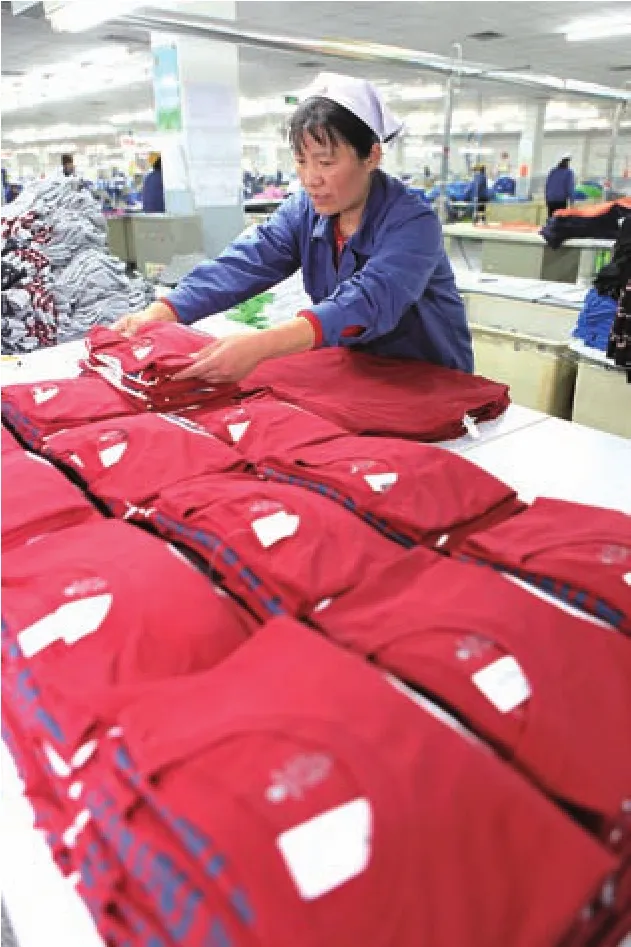
NEATLY FOLDED A farmer works in a garment packaging company in Jimo, Shandong Province. The city has in recent years made great efforts to help with local employment
The China Electricity Council (CEC) said the country faces tightened supplies of electric power this year, with a shortage estimated to reach 40 million kwh.
Both regional and seasonal power shortages will occur in 2012, the CEC warned.
The CEC expected the country’s electric power consumption this year to reach 514 million kwh, up 9.5 percent year on year. The growth rate represents an 11.7-percent decrease from 2011, as China is expected to experience slower economic growth this year.
The CEC added that China needs to improve its coal production capacity and increase imports to support rising demand for power-generating coal.
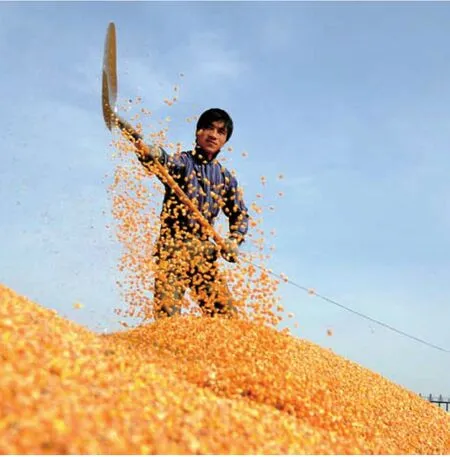
BUMPER HARVEST A worker sifts corn in Tongxin County, Ningxia Hui Autonomous Region. Purchase prices of corn have been increasing recently due to bouyant demand

TRANSPORT BOOM A container terminal at the Qinghuangdao Port, Hebei Province. Annual container throughput capacity of the province is expected to reach 6 million TEUs by 2015
Hiking Fuel Prices
China raised retail prices for gasoline and diesel by 300 yuan ($47.53) per ton on February 8.
The benchmark retail price of gasoline will be lifted by 0.22 yuan (3.5 cents) per liter and diesel by 0.26 yuan (4.1 cents) per liter, said the National Development and Reform Commission.
The latest price change, which was much anticipated by the market, comes amid rising pressures for the country’s refineries as the increasing international crude oil futures prices keep driving up their operation costs.
Businesswoman Sentenced
Wu Ying, 31, former boss of Bense Group, a business conglomerate based in east China's Zhejiang Province, received the death sentence for cheating investors out of several hundred million yuan in January. The sentence upheld the results of a previous trial at the Jinhua Intermediate People’s Court in December 2009.
From May 2005 to February 2007, Wu raised 770 million yuan ($122 million) by promising high returns to investors. She still had 380 million yuan ($60.3 million) unpaid debt with creditors when the case was uncovered. Wu amassed the fortune by fabricating facts, deliberately hiding the truth, and promising high returns as an incentive. Most companies she registered haven’t actually been opened or are losing money all the time. The death-sentence verdict has sparked a heated controversy in society, with netizens calling for a more lenient punishment. A report from Xinhua news agency said that the controversy stirred by Wu’s death sentence showed the urgency of the reform in China’s financial system.


XINHUA/AFP
HUNGARY
Passengers wait in front of the ticketing desk of Hungarian airline Malev in the Budapest Ferenc Liszt International Airport on February 3. The financially strained carrier grounded all its flights a month after the EU said it must pay back state aid

Penguins in a zoo in Asahikawa onFebruary 3. Severe snowfall hit western and northern Japan in early February
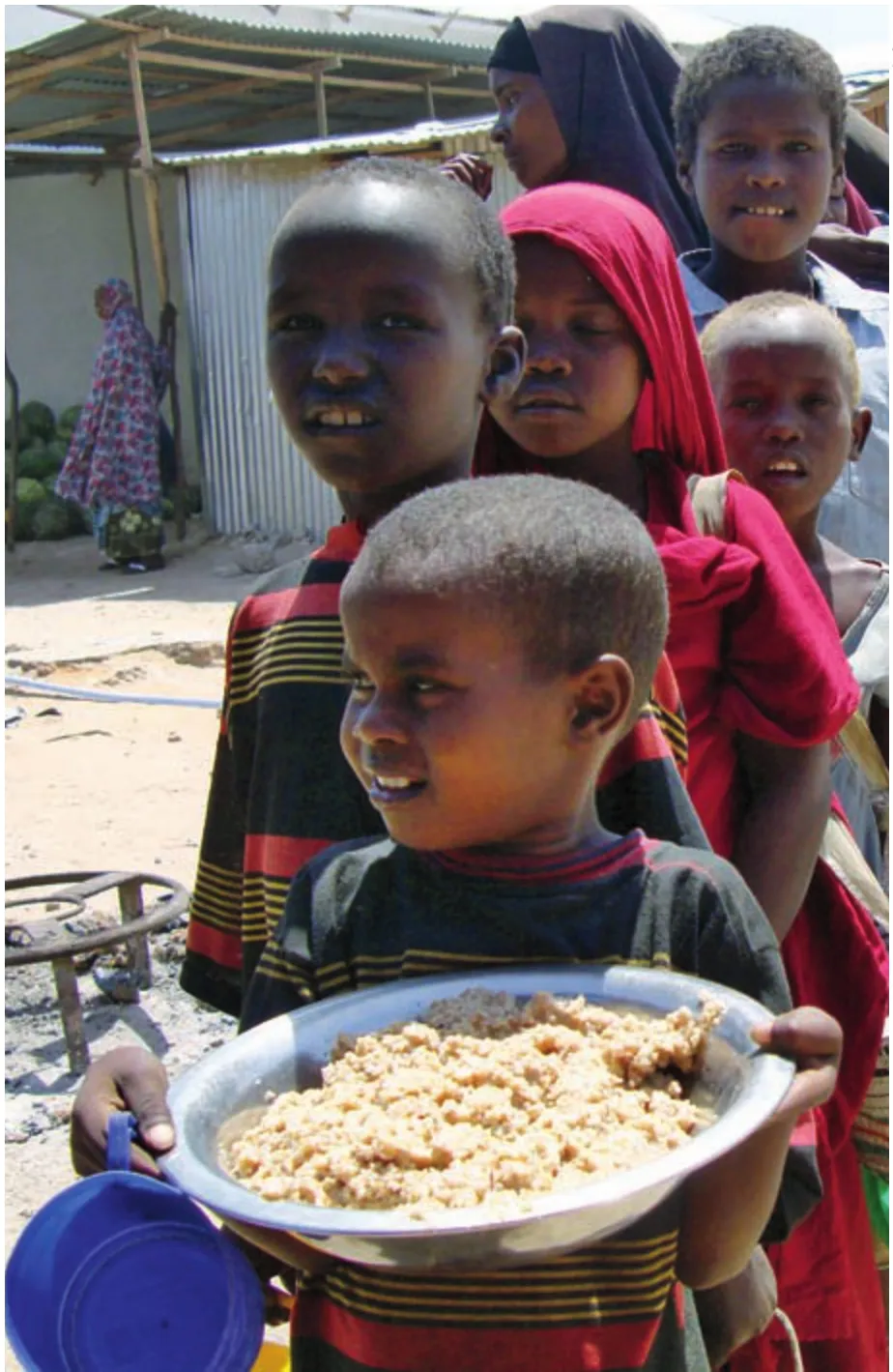
XINHUA/AFP
Displaced children receive food rations at a feeding center in Mogadishu. The UN said on February 3 that famine conditions have ended in this war-torn country six months after they were declared. But the situation remains dire, with nearly a third of the population needing emergency support
legal assistance, said the Ministry of Justice on February 8.
SOMALIA
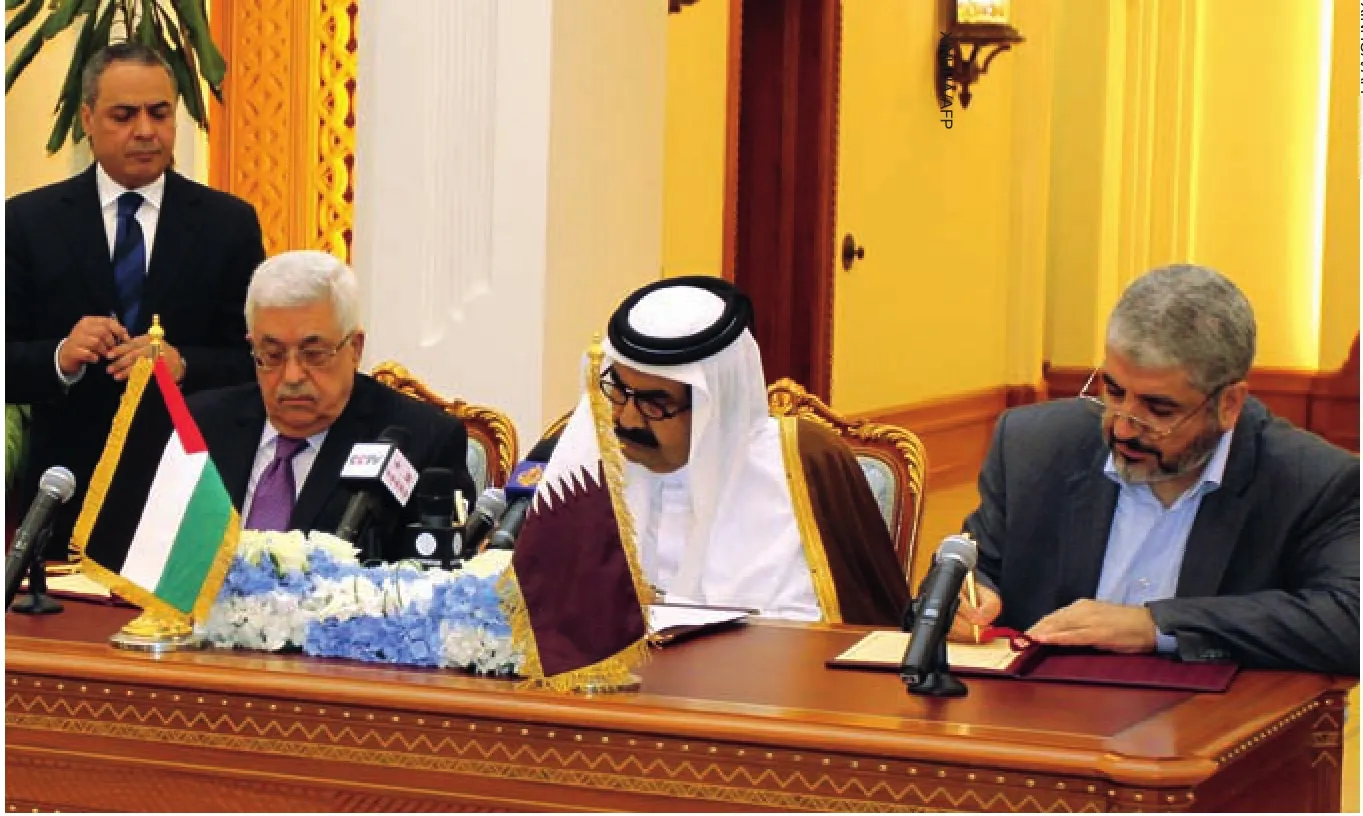
Palestinian President and Fatah chief Mahmoud Abbas (left) signs a unity government agreement with Hamas chief Khaled Meshaal (right) in the presence of Sheikh Hamad Bin Khalifa Al Thani (middle), Qatar’s Emir, on February 6 in Doha. A unified transitional government headed by Abbas will be formed for the West Bank and the Gaza Strip
QATAR
THE MALDIVES

Mohamed Nasheed, President of the Maldives, announces his resignation on February 7 in Male after a mutiny by the police and weeks of demonstrations
BRITAIN

Queen Elizabeth II greets subjects in King’s Lynn on February 6. The day marked 60 years since the Queen’s accession to the throne
